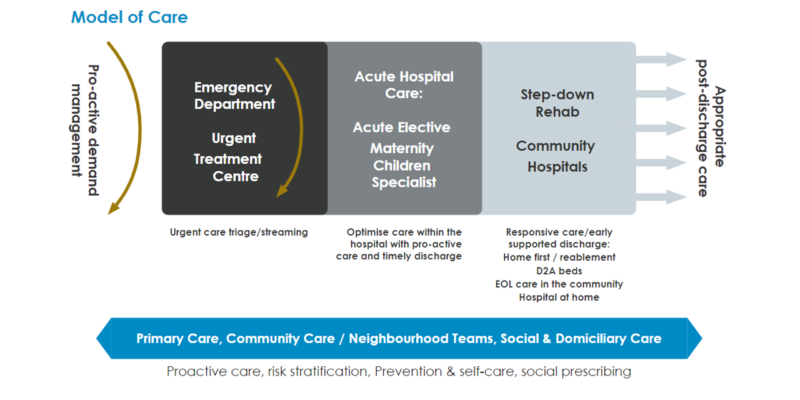Summary
Start Date // April 2020
Date Complete // June 2022
Lincolnshire ICS recognised the need to deliver change and to attract capital investment across the system. They set out to develop a system-wide strategy to reflect their emerging requirements which resulted in an evidence base to provide a strong case for health infrastructure investment across their entire system.
The objectives of this commission were:
- To enable each Trust within the system to identify and prioritise their estate optimisation, disinvestment, and subsequent capital investment requirements to address population health priorities and future service needs across Lincolnshire.
- To support the production of capital investment plans for Trusts within Lincolnshire and places and help ICSs to aggregate and prioritise requirements against other system demands for capital.
exi adopted a strategy to develop a framework for a systemwide strategy to reflect a strategic health narrative and evidence base to provide a strong case to maximise health infrastructure investment across the system.
This is about capacity not ownership – delivering the right care in the right place, to meet demand. It’s about the future service provision and reducing health inequalities in the system.
It is about a delivery strategy to attract significant capital investment to tackle the challenges in Lincolnshire and future service provision, and as a result will improve clinical outcomes, enhance service provision, and reduce health inequalities.
Service
To develop this system-wide clinical and estate strategy, exi provided a multi-disciplinary professional team comprising of the following disciplines:
- Project management
- Healthcare planning
- Digital management
- Estates planning and design
- Cost management
- Building services design, NZC advisory & infrastructure review
This approach ensures that Lincolnshire ICS and NHS colleagues enjoy the benefits of a true multi-disciplinary service offering from exi, meaning their involvement in the commission is restricted to value-adding work. exi are working as a natural extension of their team to ensure successful outcomes for Lincolnshire.
Approach
exi engaged with service provider leads to establish capacity needs, how the intended system is, and as a basis to pressure test in future stages. The work reflects a data-driven view of the county and is to be used as a building block to enable further discussion and aid conversation. We explored the art of the possible with regards to digital first implementation and the effect this can make on patient outcomes and the estate requirements.
The integrated care vision has been developed as a system wide approach which will encompass the Acute, Community, Primary Care, Mental Health, and Home Care sectors. The below diagram shows the facilities required within the integrated care vision and model of care, all of which are subject to further consultation.

This work:
- Enables Lincolnshire to utilise their system estate more efficiently
- Explored, identified, and articulated the ‘need’ across the system
- Outlines a summary of work to give reassurance that gives the best possible view on Trust and ICS needs
- Created a system-wide activity modelling database that can be used by all partners
- Identifies ways that digital transformation can be applied across the system to support future care
- Paves the way for further development at organisational level to help reduce travel times, improved geographical spread of services and enhanced accessibility for patients.
Added value & outcomes
This work outlines a quantum of activity requirements over the next 15 years, based on high level planning assumptions, to enable us to address the following key challenges:
- Geographical disparity – Clinical services are not currently in the right place to meet patient demands.
- Current health inequalities and health deprivation – Eastern coastal towns, such as Mablethorpe and Skegness, and urban areas, including Lincoln and Gainsborough tend to have higher levels of deprivation and poorer healthcare outcomes across the lifecycle.
- An aging estate & poor digital infrastructure – there are significant issues with the current estate, so the Trust are developing infrastructure plans to modernise the NHS infrastructure across the whole system for the next 15 years. Limited significant investment across the system in recent years has resulted in poor JAG accreditation ratings and compromised patient outcomes.
- Workforce allocation efficiencies – With the existing resources often addressing reactive needs rather than preventative aspects of care.
- Aging population – The population aged above 65 is anticipated to increase by approx. 37% over the next 20 years with the proportion of this age group anticipated to increase also from circa 23% in 2021 to 31.5% in 2041. This will compound the pressures on the healthcare system.
The strategy that exi have developed for this commission:
- Sets the framework to enable each Trust within the system to identify and prioritise their estate optimisation, disinvestment, and subsequent capital investment requirements to address population health priorities and future service needs across Lincolnshire.
- Supports the production of capital investment plans for Trusts within Lincolnshire and places and help ICSs to aggregate and prioritise requirements against other system demands for capital (Summer 2024’ driver)
- Sets the strategic context to which all organisational level business cases will sit. Enable ICS support for future Business Case submissions; providing context to align with the ‘system wide’ strategy (Fundamental NHSEI Business Case and Estates Criteria requirement)
- Assists the system in following advice set out in ‘Planning, assuring, and delivering service change for patients’ (2018) paper
- Supports the government’s Levelling Up (LUF) agenda
Any business case needs to sit in the context of the ICS. This work will help Trusts map out their organisational strategies to align with the system.
A coordinated ICS agreed strategy that each Trust responds to with their own Case for Investments.
The clinical plan will provide clinical directors and senior leadership teams with the opportunity to assess the application of ICS priorities in addition to determining local demand drivers affecting the wider population. It provides an opportunity to capture ICS clinical and estates plans into an evidenced based document.
This framework supports the Levelling Up agenda – as a system it is critical that we improve productivity, boost economic growth, encourage innovation, create good jobs, enhance educational attainment and renovate the social and cultural fabric of those parts of the UK that have stalled and not – so far – shared equally in our nation’s success.

